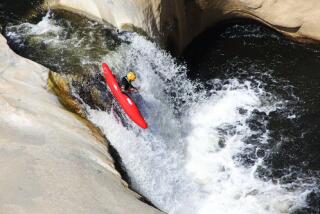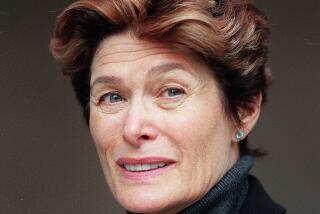Inquiry launched in water death
SACRAMENTO — With public concern growing, law officers launched a formal inquiry Wednesday into the death of a 28-year-old mother after she drank nearly 2 gallons of water in a radio station’s on-air contest.
Jennifer Strange, a mother of three from suburban Rancho Cordova, died Friday of apparent water intoxication hours after a failed attempt to win a Nintendo Wii video game system for her children in a promotion dubbed “Hold Your Wee for a Wii.”
Law enforcement officials suggested in the days after Strange’s death that criminal charges appeared to be unwarranted, but Sacramento County Sheriff John McGinness said his detectives now would conduct a full inquiry to exhaust any possibility that a crime was committed.
“We’re going to address a series of questions to make absolutely sure there’s no question of criminal culpability,” McGinness said before holding an afternoon news conference. “It was a foolish, high-risk stunt, probably more so than any of the participants realized. The question is: Was there a violation of the law?”
Among other issues, investigators will try to determine whether Strange was aware of on-air chatter about the possible risks.
A tape of the program, known as the “Morning Rave” on KDND-FM, reveals that the potential fatal effects of drinking too much water were raised during the course of the contest, with one on-air host mentioning the 2005 death of a college student during a hazing ritual in Chico. A listener also called in to advise against the stunt.
Strange -- one of 20 contestants -- initially joked lightheartedly with the show hosts as she and the others chugged bottled water. But as the hours wore on, it came down to Strange and one other woman contending for the grand prize, and she admitted to having a splitting headache and feeling wobbly. Strange quipped on air that “it looks like I’m pregnant again.”
After finishing in second place, Strange rushed with contest winner Lucy Davidson to the station’s bathroom to vomit. Strange called her employer to say she was too sick to come in and headed home. Her mother discovered her body that afternoon.
A preliminary review by the Sacramento County coroner found that she probably died of water intoxication, also called hyperhydration. People who drink too much water too fast can dilute their body fluids, creating potentially deadly shifts in their electrolyte levels.
An attorney representing Strange’s husband and three children on Wednesday dispatched a news release announcing plans to file a wrongful-death lawsuit against the radio station.
Officials at Entercom Communications Corp., the station’s Philadelphia-based owner, fired 10 people at KDND on Tuesday, including station manager Steve Weed, promotions chief Robin Pechota, producer Liz Diaz and the five on-air people involved in the show: Adam Cox, Steve Maney, Patricia Sweet, Matt Carter and Pete Inzerillo. None returned calls for comment.
Entercom officials sent grief counselors to the station in the Sacramento suburbs and have repeatedly voiced sorrow for the tragedy and offered condolences to the Strange family.
“We haven’t been contacted by the sheriff’s office, but we will of course cooperate with their investigation,” said Charles Sipkins, an Entercom spokesman.
McGinness, the sheriff, said he would be surprised if the investigation turned up anything worthy of criminal charges.
The Chico case involved a student acting under peer pressure, but Strange was a grown woman who agreed to take part and resisted several attempts by the radio hosts to persuade her to quit, the sheriff said.
“She was a willing participant in an admittedly ill-advised stunt,” McGinness said. “It’s not conduct that is illegal by its very nature, like recklessly discharging a gun. She was an adult exercising her own free will.”
The death has sent ripples through the radio industry -- among disc jockeys and station managers, consultants and attorneys.
This isn’t the first time that a station’s contest has had fatal consequences, said George Francis, a veteran general manager and station owner from Greenville, S.C.
In 1970, teenagers speeding to hunt down Los Angeles disc jockey “The Real Don Steele” for a cash prize crashed into a car, killing the driver.
Francis said a radio station contestant once choked to death during a doughnut-eating stunt. In 2000, a 37-year-old woman died of a head injury after she fell among a crowd that had flocked to a radio station stunt involving a Britney Spears look-alike in upstate New York.
Several stations have faced lawsuits after broadcasting from bars from which happy-hour participants later hit the road and caused fatal accidents.
Francis and other industry watchers say they won’t be surprised if lessons learned from the Sacramento tragedy are short-lived in a business rife with turnover.
Radio is also a medium -- rock, rap or reggae -- in which the maturity of on-air personalities sometimes mirrors that of their youthful audiences and the stakes in capturing market share can spawn risky, can’t-top-this promotional efforts.
“Sadly, people in the radio industry have a short memory,” Francis said. “It’s young people who get into quote-unquote show business. And sometimes the need for notoriety and promotion exceeds good judgment.”
“Anyone with half an ounce of sense would realize this was crazy,” said Mike McVay, a radio consultant from Cleveland.
Tom Taylor, editor of the industry newsletter Inside Radio, sees foolish stunts as an outgrowth of a risk-taking society -- reflected by the media in reality television shows such as “Fear Factor” and the bone-jarring “Jackass” movies.
More to Read
Sign up for Essential California
The most important California stories and recommendations in your inbox every morning.
You may occasionally receive promotional content from the Los Angeles Times.










